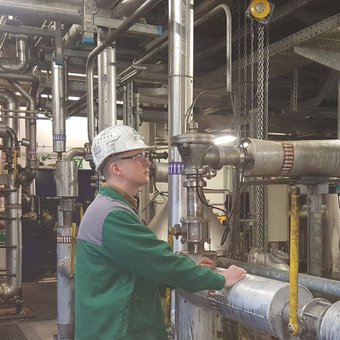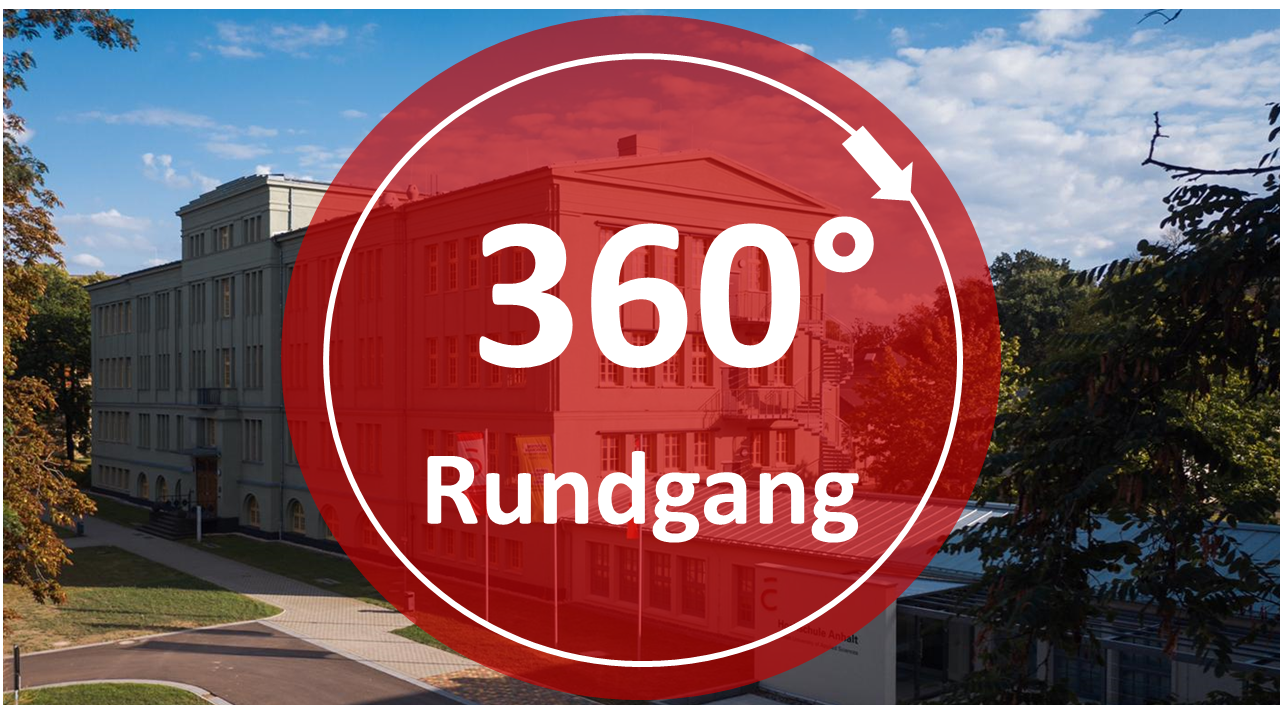Process Engineering (career-integrated bachelor's degree, distance learning)
-
What is Process Engineering?
From raw material to high-quality end product
Process engineering deals with all processes in which basic materials - raw materials such as crude oil, natural gas or iron ore, crops such as wheat or hops, animal products such as milk or meat - are changed in their composition or properties or are converted into fuels, plastics, food or medicines. This includes all processes in technology and business in which new, high-quality products are manufactured from raw materials. The list of process-engineered products is long, and the list of processes and equipment required to produce them is even longer. In bio plants, for example, algae are converted into fuels, food, or medicines by biological, chemical or physical processes. Depending on the process, a distinction is made between the sub-areas of mechanical, thermal, chemical or bioprocess engineering.
Process engineering is typically characterized by its continuous nature. The materials "flow" through the plants in large quantities. A walk through a process plant, e.g. for the production of plastics or sugar, reveals a multitude of piping and cleaning systems, stainless steel tanks, dosing and conveying systems, as well as pumps and other apparatus. Of course, this also includes modern process control and automation technology.
Anyone who sees their professional future in the chemical and pharmaceutical industries, in environmental technology, the food industry, or in brewing beer should be familiar with processes and the equipment for pumping liquids, or for crushing, mixing and separating solids.
-
What does the degree program entail?
The 9-semester (180 credits) career-integrated degree program in Process Engineering includes scientific as well as technical modules. The bachelor's program is practice-oriented and prepares students for careers in the technical field. In addition, students receive scientific training. The program is divided into core and advanced modules.
The learning objectives are achieved through a combination of attendance phases (four times on Fridays and Saturdays and one attendance week per semester) and guided independent study using e-learning platforms (including Moodle). Attendance phases include seminar classes, practical courses (credits may be awarded based on proven prior knowledge), consultations and examinations. Module examinations take place over the course of the semester, which meets the needs of students in career-integrated degree programs.
At the beginning of the program, students acquire comprehensive foundational knowledge in the natural sciences. The curriculum and examination plan for engineers includes, for example, mathematics and statistics, chemistry, physics and computer science. Basic engineering education includes technical modules such as: Technical Fluid Mechanics, Technical Thermodynamics, Technical Mechanics and Computer Aided Design (CAD), Measuring and Control Technology and Materials Science. Later in the degree program, program-specific modules are included, such as: Chemical, Mechanical and Thermal Process Engineering, Supply and Disposal Engineering, Process Systems, Apparatus and Plant Engineering and Safety Engineering. Students can discover and/or expand their own interests by choosing elective modules (including Power Plant Engineering, Air Pollution Prevention, Fluid Mechanics, Project and Quality Management).
The practice-oriented bachelor's degree program in Process Engineering includes a project and a 20-week bachelor's thesis (see examples below). In this context, students can/should work on tasks from their work environment. However, students also have the opportunity to actively participate in the department's research projects.
- Numerische Simulation der Konzentrationsverteilung von dispersen Zweiphasenströmungen bei Suspendierprozessen mit dem Euler-Lagrange-Verfahren
- Cross-Flow-Mikrofiltration für die Aufkonzentrierung von Mikroorganismen aus Gewässern
- Konstruktion, Aufbau und Erprobung eines hochtemperaturfähigen Ionenmobilitätsspektrometers
- Untersuchung zur Umstellung des Konditionierungsmittels in den Kühlsystemen der SKW Stickstoffwerke Piesteritz GmbH
- Beurteilung verschiedener Methoden zum Zellaufschluss von Scenedesmus vacuolatus mit dem Fluoreszenzfarbstoff Sytox Green
- Konzipierung einer Anlage zur Entspannung ungereinigter Tankwagen
- Numerische Untersuchungen zur Modellierung eines als Stromstörer eingesetzten Rohrbündelwärmeübertragers
- Einfluss der Gaszusammensetzung auf die CO-Shift-Reaktion am Beispiel der TOTAL Raffinerie Mitteldeutschland GmbH
- Untersuchung des Wärmetransports bei der Vinylacetat-Ethylen-Copolymerisation
- Untersuchungen zum Stofftransport in einem elektrochemischen Parallelplattenreaktor
- Optimierung der Glycerindestillation durch Integration eines Dekanters mit dem Ziel der Kosteneinsparung
-
What are my career opportunities?
After completing a bachelor's degree in Process Engineering, students can enter many different careers, expand their technical focus in a master's degree program, and/or prepare for a possible doctorate.
The process engineer is also known as the "Swiss army knife" among engineers. Because the knowledge and expertise of the process engineer are not specific to one industry, there are a variety of entry-level opportunities. The chemical, pharmaceutical and food industries as well as apparatus and plant engineering offer young professionals a wide range of opportunities to find a job after graduation and to change jobs later if necessary. Taking a closer look, the range of industries utilizing process technology for production is enormous: Biotechnology, environmental and waste disposal technology, recycling, paper, cellulose and cement industry, etc.
The right preparation
-
Recognition of coursework from a first degree prog
Previous academic achievements from a first degree program and/or after a change of degree program or university or following studies abroad, and thus achievements which were completed at another university, may be credited on application post enrollment.
The Examinations Committee of the Department is responsible for this in coordination with the respective degree program advisor / lecturers.
-
Important knowledge acquired at school
A prospective student of Process Engineering should have an interest in science and especially technology.
Therefore, subjects including math, chemistry and physics, but also biology, are important basics.
Ideally, you will have taken an advanced course in physics or mathematics and/or have completed vocational training in a profession related to technology or chemistry.
-
Preparation classes
Whether mathematics or physics - please use the following links for corresponding courses of the VDI:
Online bridge course physics
Online bridge course mathematicsIf you have any further questions, please contact the program coordinator or the program advisor.
-
Study without a higher education entrance qualific
If you do not have a higher education entrance qualification but would still like to study with us, you will find all the relevant information via the link below.
-
University Information Day
In June of each year, the Köthen Campus hosts University Information Day.
Anyone interested in studying at Anhalt University is invited to get to know the University, our lecturers and students, as well as our degree programs. You can get a personal impression of our facilities and the campus and receive individual advice.The date of the next University Information Day in Köthen as well as at Dessau Campus and Bernburg Campus can be found here.
Important information about the career-integrated degree program
-
Information about in-person classes / online teach
The periods with required attendance during a semester follow the pattern below:
Four times on Fridays and Saturdays for lectures, practical courses, internship, consultations, projects and exams
One week of lectures, practical courses, lab/pool classes, consultations, projects, examinations
Die Präsenzzeiten werden im Voraus bekanntgegeben. Participating in the classes offered is voluntary.
-
Examinations
All examinations/written exams are held at the Anhalt University of Applied Sciences in Köthen. The examination dates are already included in the attendance phases and take place exclusively within this period.
Individual dates for repeat examinations are available by arrangement with the program coordinator.
-
Educational leave
This degree program is approved for educational leave. You may request educational leave from your employer for up to 5 days per year.
-
Career-integrated master’s degree program
Following your bachelor's degree, you have the opportunity to continue your academic education with us at Anhalt University of Applied Sciences via the career-integrated master's degree program in Process Engineering.
-
distinguished additional certificate from TÜV SÜD
Quality assurance is essential for the industry and therefore is the focus of the training and continuing education of specialists. At Anhalt University of Applied Sciences, students can gain practical quality management knowledge and acquire a distinguished additional certificate from TÜV SÜD (QMF Certificate).
Prof. Dr. Jean Titze teaches the module Quality Management. He has worked in the industry for over ten years and, as an approved TÜV consultant, is able to offer this additional training. Especially students in active employment can update their expertise in quality management and gain an additional certification of their competence. In addition, their companies can also benefit from the knowledge acquired at the university.
Program sequence & program contents
-
1st semester
Angewandte Chemie
Mathematik I
Physik für Ingenieure
Technische Mechanik -
2nd semester
Mathematik II
Allgemeine Betriebswirtschaftslehre und Marketing
Ingenieurinformatik
Organische Chemie -
3rd semester
Automatisierungs- und Elektrotechnik
Technische Thermodynamik
Physical Chemistry
Technische Strömungsmechanik -
4th semester
Reaction Process Machinery
Mechanische Verfahrenstechnik
Mess- und Regelungstechnik
Thermische Verfahrenstechnik -
5th semester
Apparatetechnik
Process Engineering
Internship Bioprocess Engineering.
Elective module 1
Proof of practical experience -
6th semester
Energietechnik
Instrumentelle Analytik
Elective module 2
Elective module 3
Proof of practical experience -
7th semester
Law
Elective module 4
Elective module 5
Elective module 6
Proof of practical experience -
8. semester
Project work and academic writing
The project can either be a research paper (theoretical) or a lab project (practical).
Bachelor’s thesis with colloquium (= defense)
20 weeks

Having completed your degree is a fantastic feeling. I'm still in the same company, but my colleagues perceive me very differently.
Anja Diete Graduate Process Engineering (distance learning)

A distance learning program in Process Engineering requires an independent & disciplined approach to work. With the support of the university, especially the professors, you can manage this successfully.
Christian Raatz Graduate Process Engineering (distance learning)


